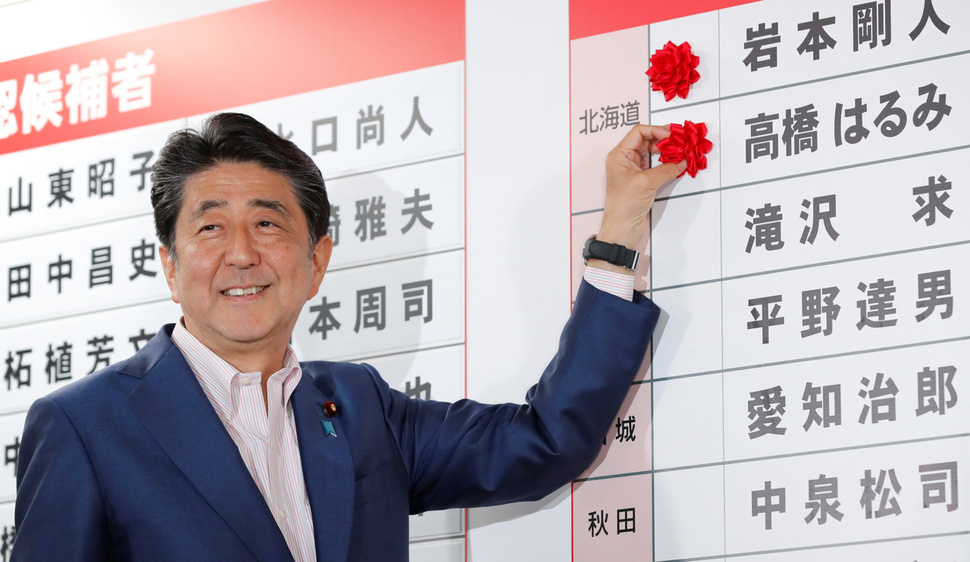Posted on : Jul.22,2019 18:08 KST
Modified on : Jul.22,2019 18:25 KST
 |
|
Japanese Prime Minister Shinzo Abe places roses next to the names of candidates expected to win seats from the House of Councillors election on July 21. (Reuters/Yonhap News)
|
Prime Minister Shinzo Abe’s Liberal Democratic Party (LDP) and the coalition party Komeito won a majority of seats on the line in the Japanese House of Councillors election on July 21. Proponents of amending the Japanese constitution – including the Japan Restoration Party – failed to acquire the two-thirds majority of total House of Councillors seats needs for such an amendment. While Abe called it a “huge victory,” the outcome could be seen as something of a check on his administration’s activities.
Of the six elections (including local ones) held since the launch of Abe’s second Cabinet in 2012, few if any have drawn this level of interest from South Korea. Part of that was because of the current crossroads in the debate on amending Japan’s Peace Constitution. But it was also seen as a bellwether election in terms of gauging the future behavior of the Abe administration, which has been waging an all-out offensive in terms of relations with Seoul. It’s viewing things too narrowly to see the administration’s recent export controls on South Korea as simply part of an LDP election strategy. But it is very worrying to consider how any constraints on the administration’s arbitrary decisions and free hand will be effectively gone once the Abe administration gains “wings” by acquiring the necessary seats in both the House of Representatives and House of Councillors to amend the constitution.
Abe put the constitutional amendment issue front and center throughout the election process, questioning whether parties would “responsibly discuss things or irresponsibly refuse to even consider them.” In part, this was an attempt to deflect some of the issues forcefully raised by opposition parties, including issues with the national pension (following the publication of report indicating a “20 million yen [US$185,240] shortfall in post-retirement funds”) and the raising of the consumption tax. As the LDP’s “new era” election slogan indicated, however, the aim is effectively to alter the very order that has prevailed in Japan over the 70 years since the war.
Once it is proposed by two-thirds of lawmakers in the lower House of Representatives and upper House of Councillors, the matter of amending the Japanese constitution will be put up for a national referendum, where it will be decided by majority vote. Having secured a margin of close to 80% in support of amendment in the 2017 House of Representatives election, Abe has repeatedly talked about proceeding with it in 2020. Even without securing the necessary two-thirds this time, many are predicting he will start going after conservative opposition forces and ramping up the amendment debate.
Not only would Abe’s plans spell a radical shift for the postwar regime under which Japan achieved prosperity with its Peace Constitution stipulating the abandonment of war, but in light of the current political situation, it would also raise tensions in East Asia and throughout the international community. International opinion on the Japanese government’s trade retaliation measures against South Korea is becoming increasingly critical – as exemplified by the UK publication “The Economist” describing them as “reckless self-harm” both economically and geopolitically. US President Donald Trump’s remarks the day before yesterday hinting at the possibility of intervention – albeit on the condition that both the South Korean and Japanese leaders want it – is another sign that the situation with South Korea-Japan relations is not simply a matter for the two sides. More than anything, we have to wonder how welcoming other countries will be of a Japan capable of making war when it refuses to reflect on its own past – as demonstrated by its attitude toward South Korean survivors of forced labor – and lays waste to the very international trade order.
The global order today is very different now from how it was a century or so ago when Japan was advocating “leaving Asia and joining Europe.” South Korea, for its part, no longer shrinks in the face of Japanese threats. Japan has announced plans to hold a public comment period through July 24 on whether to take South Korea off of its white list. We urge the Abe administration to take the international community’s concerns seriously and make a wise decision.
Please direct comments or questions to [english@hani.co.kr]






